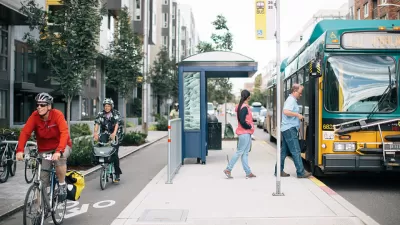Higher demand for electricity and lower capacity for production due to more intense heat waves are straining the power grid and causing concern for future energy production.

This year's heat wave, writes Jonathan Thompson, exposed critical vulnerabilities in our infrastructure. And "the heat’s biggest — and perhaps most consequential — infrastructure victim was the vast electricity grid that powers nearly every aspect of modern life."
"Extreme weather exacerbated by climate change can mess with the grid in any number of ways: Cold can freeze gas lines, while hurricanes topple transmission towers. But heat, particularly when combined with hydropower-depleting drought, has an especially deleterious effect, wreaking havoc on the power system just when the warmer climes need it most."
By their very existence, "power plants — the fossil-fueled 'heart' of the grid — make climate change worse and the planet even warmer, creating a feedback loop that resembles a gigantic electrical monster swallowing its own tail," Thompson writes. In addition, the hot air blown out of homes by air conditioners "actually exacerbates the urban heat island effect" and "raises the ambient temperature, increasing the need for air conditioning" in a vicious cycle. Adding to the problem, hydroelectric dams, which supply roughly 10 percent of U.S. power, lose generating capacity as their water levels drop "due to reduced flows and heat-induced evaporation." Today, reservoirs across the West–and their accompanying hydroelectric dams–are at dangerously low levels.
"The best way to avoid a heat-caused collapse of the grid," says Thompson, "is to slow human-caused climate change by cutting carbon emissions. That requires decarbonization of the grid by replacing fossil fuels with clean energy sources and–just as important–an overall reduction in energy use."
FULL STORY: Climate change wreaks havoc on the electricity grid

Maui's Vacation Rental Debate Turns Ugly
Verbal attacks, misinformation campaigns and fistfights plague a high-stakes debate to convert thousands of vacation rentals into long-term housing.

Planetizen Federal Action Tracker
A weekly monitor of how Trump’s orders and actions are impacting planners and planning in America.

In Urban Planning, AI Prompting Could be the New Design Thinking
Creativity has long been key to great urban design. What if we see AI as our new creative partner?

King County Supportive Housing Program Offers Hope for Unhoused Residents
The county is taking a ‘Housing First’ approach that prioritizes getting people into housing, then offering wraparound supportive services.

Researchers Use AI to Get Clearer Picture of US Housing
Analysts are using artificial intelligence to supercharge their research by allowing them to comb through data faster. Though these AI tools can be error prone, they save time and housing researchers are optimistic about the future.

Making Shared Micromobility More Inclusive
Cities and shared mobility system operators can do more to include people with disabilities in planning and operations, per a new report.
Urban Design for Planners 1: Software Tools
This six-course series explores essential urban design concepts using open source software and equips planners with the tools they need to participate fully in the urban design process.
Planning for Universal Design
Learn the tools for implementing Universal Design in planning regulations.
planning NEXT
Appalachian Highlands Housing Partners
Mpact (founded as Rail~Volution)
City of Camden Redevelopment Agency
City of Astoria
City of Portland
City of Laramie





























